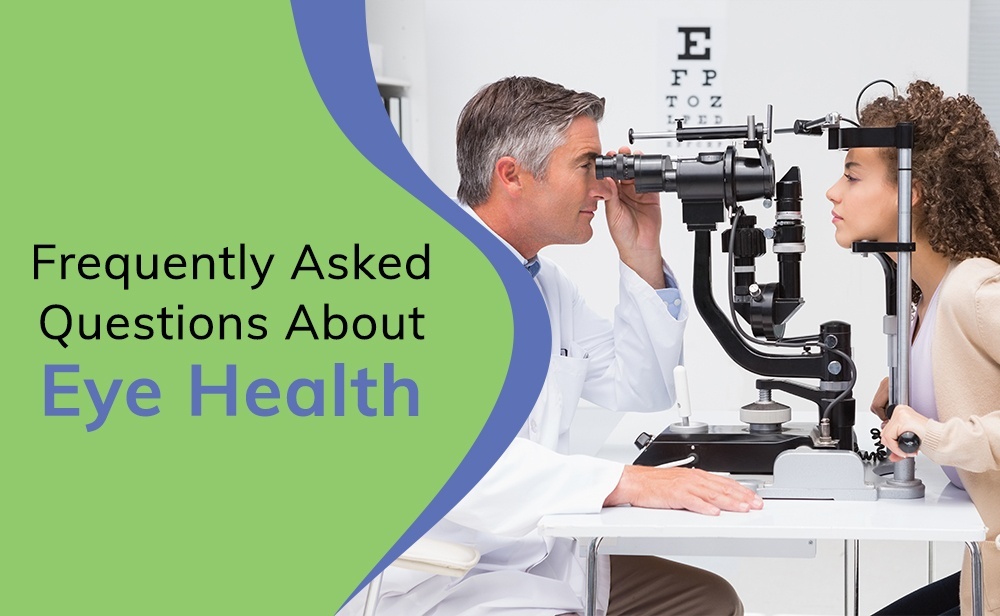Frequently Asked Questions About Eye Health

Our eyes are one of the most sensitive organs in the body. At the same time, we depend on them heavily to see around us, maintain balance, and live independently. To preserve the vitality of your eyes, it’s essential to have them checked regularly. However, when it comes to eye health, there are a ton of questions you may have, but find answers difficult to come by. To overcome this challenge, Opsis Eye Care wants to arm you with the most accurate information available and to do this, we’ve answered some of the most frequently asked questions about eye health.
1. I can see perfectly, why do I need to check my eyes?
Many eye diseases do not affect vision at the early stages. These include but are not limited to diseases such as glaucoma, macular degeneration, retinal detachment, etc. This means that you could have an eye problem before you see any changes to your vision. Regular eye exams will detect eye disease in the early stages so that it can be treated before permanent vision damage occurs or to prevent vision loss.
2. How often do I need to check my eyes?
How often you should check your eyes depends on your age and overall health. It is recommended to have annual eye exams for children who are nineteen years of age and under. The same goes for seniors and those with eye conditions. On the other hand, healthy adults should have an eye exam at least every two years. Our optometrists will recommend appropriate follow-up appointments for you based on your individual circumstance.
3. What is the difference between nearsighted and farsighted?
Many people get confused between nearsightedness and farsightedness. NEARsighted or myopia is when you can see things NEAR while distant objects are blurry. This occurs because your eye is generally longer than average. So light focuses in front of the retina instead of on your retina.
FARsighted or hyperopia is the opposite where you can see FAR objects clearly but near may be blurry depending on how farsighted you are and your focusing ability. This is because your eye is a bit smaller, and light is focused behind the retina. As your eyes can accommodate, if you’re farsighted, you may sometimes still be able to see near. But, it may be more complicated depending on how well you can focus.
4. What is the difference between cataract and glaucoma?
Many people tend to confuse cataract and glaucoma. Cataract is an eye condition where the natural lens in the eye gets cloudy. This causes vision to be foggier and dimmer. Cataract usually happens with age and excessive UV exposure. There are also other health conditions and medications that can cause cataract. Therefore, it is essential to wear sunglasses to help protect the eyes from UV and prevent cataract. Once the cataracts are mature enough to affect vision, surgery can be performed to remove them. A new artificial lens will be inserted so you will be able to see clearly again.
Glaucoma is an eye disease that causes permanent vision loss. This is mainly due to the deterioration of the nerve fiber layer. The exact cause of glaucoma is unknown but may be related to high eye pressure and reduced flow of fluid in the eye. Other risk factors of glaucoma include family history, age, race, medications, and certain health conditions. There is no cure for glaucoma. Once glaucoma is diagnosed, there are eye drops and laser therapy to keep it under control. If you have regular eye exams, your doctor can detect the disease early to prevent complete vision loss.
5. Does the blue light filter on glasses help improve my vision?
Not all blue light is harmful. Certain blue light is needed to regulate our circadian rhythm. The harmful portion of blue light has a short wavelength and emits high energy, which can cause eyestrain. Most digital devices emit a significant amount of blue light, and therefore must be used for short durations with plenty of breaks in between. Studies suggest that blue light may also increase the risk of macular degeneration. Having a blue light filter on your glasses will help to decrease eye strain and protect your eyes. However, it will not improve your vision or make it better.
If you have any more questions about eye health, get in touch with the experts at Opsis Eye Care. As optometrists or eye doctors in Markham, Ontario, we aim to help you improve your vision and overall health. For a seamless experience, our clinic can cater to all of your eye care needs. From your eye health to your glasses, contacts, eye drops, supplements, and solutions, we have it all. That way, you don’t have to go back and forth when acquiring the requirements to aid your vision.
To learn more about how we can help you, please click here or contact us by clicking here.